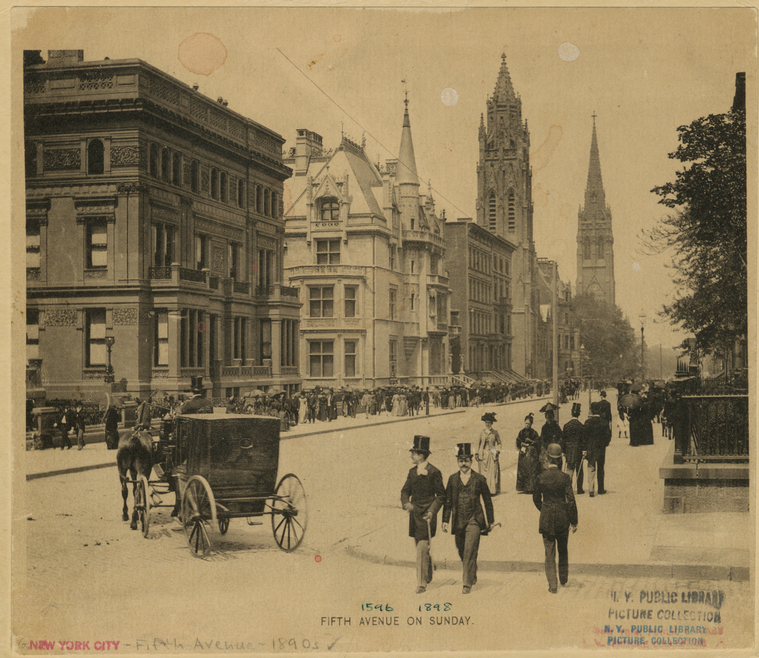Today, few people would want to give up having choices about how to spend their time off, but we ought to acknowledge that those choices deprive us of something too. Consider the experiences that Americans had a century ago when Sunday rolled around. As one psychologist put it in 1908, people enjoyed "freedom from all slavery of the clock, better and more leisurely ... meals, the hush of noise on the deserted street, the intensified charm of the sky, sunshine, trees, fields ... calls, visits, correspondence, as well as rest pure and simple, for body and mind."
Today, when Sunday comes, "rest pure and simple" is elusive if not impossible. Given that more people than ever work nights and weekends, chances are good that one spouse will go to work while the other looks after the children. Nor is "the hush of noise" easy to achieve. Streets are much less likely to be deserted than they were in 1908, and of course, televisions, telephones and computers rarely fall silent.

rest, not the creation of a single person. This is a lesson we learn, belatedly, from the American Sabbath, even as it vanishes. We rested best when others rested with us, keeping us company and giving us something fun to do as well as moral reinforcement against the fear we'll fall behind. We rest poorly when the world around us hums with activity.
Many religious professionals have preached this message from the pulpit, but the Sabbath has had its nonreligious advocates too. The most eloquent among them was Supreme Court Justice Felix Frankfurter, who argued in 1961 that Sunday-closing—or "blue"—laws don't breach the wall between church and state. Rather, he wrote, they protect a scarce public good—"community repose"—that derives from ecclesiastical tradition but is now a "cultural asset of importance." Defending the midcentury American Sunday against those who felt oppressed by it, he said that a commonly kept day of rest promoted the orderliness of a society and the health of its people by providing "a release from the daily grind, a preserve of mental peace ... a time during which the mind and body are released from the demands and distractions of an increasingly mechanized and competition-driven society."
If you want to conjure up the release Frankfurter was talking about, think of Christmas Day or New Year's morning, when even convenience stores are shuttered and streets are silent and the few passersby amble or dawdle. Twice a year is about as often as we now manage to achieve the stillness we need to feel OK about being unproductive.
This, by the way, is not because we're workaholics or Internet addicts or because religion is on the wane. It is objectively harder to stop working now than in Frankfurter's day. The pace and rhythms of work have quickened, and each pause costs more than it used to. Globalization, just-in-time manufacturing and electronic networks, among other things, have made it possible to synchronize production and communication around the globe, but they have also made it necessary to operate on a 24/7 schedule. This creates, in effect, something that Josef Stalin once admiringly called the continuous workweek. Meanwhile, mobile devices have annulled the rules that used to prompt us to stop working at regular times (5 p.m., say) and pushed us into a zone of frictionless activity without temporal boundaries.
 You may wonder what the Sabbath can do to help us counter these enormous social, technological and economic forces. The answer is, very little—but a little can be a lot. We are not likely to bring back blue laws, and that is, on the whole, a good thing. But the Sabbath is not just a day off. It is also an idea. Actually, it's three ideas, embedded in the Fourth Commandment, the one that talks of keeping the Sabbath.
You may wonder what the Sabbath can do to help us counter these enormous social, technological and economic forces. The answer is, very little—but a little can be a lot. We are not likely to bring back blue laws, and that is, on the whole, a good thing. But the Sabbath is not just a day off. It is also an idea. Actually, it's three ideas, embedded in the Fourth Commandment, the one that talks of keeping the Sabbath.
The first is the idea that everyone, not just the idle rich, has a right to rest regularly. The second is the idea that the good society makes life better for its members by protecting that rest.
The third idea, which is perhaps the most powerful of all, is simply to "remember the Sabbath." That is something we all can do, whether or not we choose to honor it. We can simply think hard about it, trying to puzzle out all that this very old and once-venerable human institution has to teach us about work, rest, time, sanity and the good life. What we might come up with if we figured that out remains a tantalizing mystery.
This essay also appeared in the Los Angeles Times.
* * *
On Feb. 22, Judith Shulevitz will discuss her book, The Sabbath World: Glimpses of a Different Order of Time, at 6:30 p.m. at the Mid-Manhattan Library.

 With your library card, it's easier than ever to choose from more than 300,000 e-books on SimplyE, The New York Public Library's free e-reader app. Gain access to digital resources for all ages, including e-books, audiobooks, databases, and more.
With your library card, it's easier than ever to choose from more than 300,000 e-books on SimplyE, The New York Public Library's free e-reader app. Gain access to digital resources for all ages, including e-books, audiobooks, databases, and more.